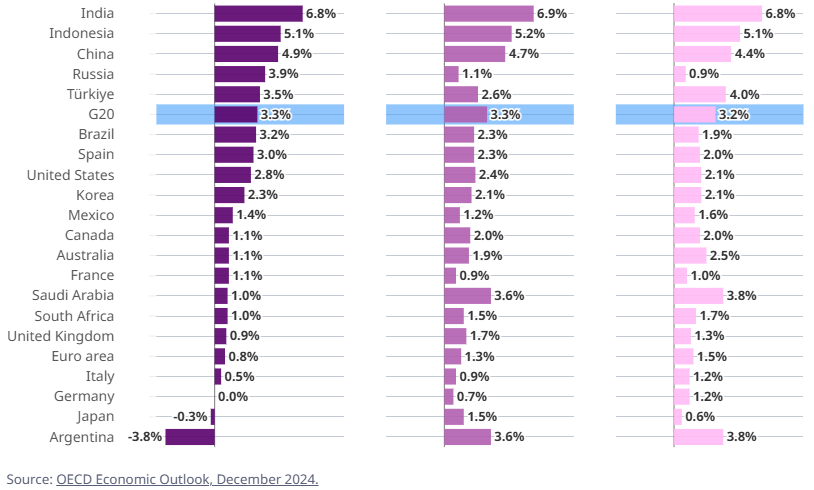The global economy is expected to grow at 3.3 per cent in 2025 and 2026, slightly up from 3.2 per cent in 2024, according to the OECD’s latest Economic Outlook. Despite challenges, including geopolitical tensions and high public debt, global GDP growth remains stable. The outlook also includes strong growth projections for major economies such as Saudi Arabia, Brazil, Mexico, Argentina, and Canada.
Inflation Eases, Trade Recovers
Inflation in OECD countries is forecast to fall from 5.4 per cent in 2024 to 3.8 per cent in 2025, and 3.0 per cent in 2026. Inflation is already on target in many advanced and emerging economies. Global trade volumes are expected to grow by 3.6 per cent in 2024, benefiting countries like Brazil and Mexico, which have seen a rise in exports.
Labour Market Trends
Labour markets have gradually eased, but unemployment remains low by historical standards. Nominal wage gains continue, and disinflation has supported real household incomes. However, private consumption growth remains subdued in many countries, reflecting weak consumer confidence. In countries like Saudi Arabia, Brazil, and Mexico, labour markets are recovering as domestic demand and trade improve, but challenges related to labour shortages persist, especially in advanced economies.
Varied Regional Growth
- Growth in the United States is expected to grow by a robust 2.8 per cent in 2024, and slow only gradually to 2.4 per cent in 2025, and 2.1 per cent in 2026.
- The euro area will see modest growth of 1.3 per cent in 2025 and 1.5 per cent in 2026.
- Mexico’s GDP is forecast to expand moderately, growing by 1.4 per cent in 2024, 1.2 per cent in 2025, and 1.6 per cent in 2026.
- Argentina, facing economic challenges, GDP is expected to contract by 3.8 per cent in 2024 and rise by 3.6 per cent in 2025 and 3.8 per cent in 2026.
- Canada is projected to maintain stable growth, with a forecast of 1.1 per cent in 2024 to 2.0 per cent in 2025, and 2.0 per cent in 2026.

Challenges and Risks
OECD Secretary-General Mathias Cormann noted ongoing risks, including geopolitical tensions, fiscal pressures, and weak medium-term growth. These factors could affect growth in regions such as the Middle East and Latin America, but policy action can help maintain stability.
Policy Recommendations
The OECD advocates for continued monetary policy easing in advanced economies, alongside fiscal reforms to manage public debt. Structural reforms, particularly in education and skills development, are crucial to address labour shortages and boost growth. Countries like Brazil, Mexico, and Argentina may also benefit from enhancing trade policies and attracting investment to strengthen their economies.
Positive Outlook Possible
While risks remain, improvements in consumer confidence and resolving geopolitical issues could lead to stronger-than-expected growth, especially in emerging markets like Saudi Arabia, Brazil, and Mexico.
Attribution: OECD
Subediting: Y.Yasser


